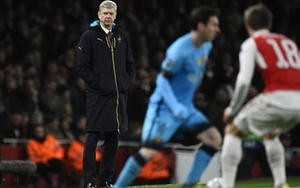How many great teams does the itinerant modern super-coach create? And how many, would he concede in private, does he inherit? How many times will Pep Guardiola, Ancelotti or Mourinho, catch the wave at the right time in the life of a super-club and add another Champions League title to the list? There is coaching and then there is managing, and the victories of the past – the kind that Wenger has tried to achieve – are of a different hue altogether.
If Enrique wins a second Champions League this season, does that really put him on the same level as Ferguson, the great club-builder? Or Brian Clough, the man who fashioned Nottingham Forest’s two-times European champions from the husk of second division strugglers? If Zinedine Zidane was to win his first as a coach with Real Madrid this May does he compare to Matt Busby?

The modern Champions League is a giant battle of super-club infrastructures, a war of the game’s old money and its new fossil fuel fortunes; of vast global scouting network and the dead hand of technical directors harvesting talent in much the same way those seabed trawlers dredge for fish. Everyone agrees the coach is important but his long-term influence can be hard to detect, and you know that at every one of these clubs there is a document detailing the options for the day he is sacked.
On nights like Tuesday, it is worth remembering that Arsenal are different - for better, for worse. They are still the club of their manager, with all his beliefs, his strengths, his neuroses and his weaknesses. The tendency is to dwell on the mistakes, and the stubbornness, and there has been plenty of those, but at times you have to remember that Wenger is the last of an old order of managers whose influence and job spec has been denuded.
He reached a final in 2006 but his best chance of a Champions League title with Arsenal was 12 years ago, when they were the best team in Europe and lost to Chelsea side in the quarter-finals. Since then the Frenchman has clung on to the dream of Arsenal’s first triumph but if he really wanted to win it, he needed to do what most of the new generation do these days: pick a new club to fulfil his ambition.

With his stock high and well aware of the future conditions under the Emirates Stadium financing programme, Wenger was once the prize for every new owner or president. In the summer of 2004, Florentino Perez tried to recruit Wenger during his first spell as Real Madrid president. In the summer of 2006, the Madrid presidential candidate, Juan Miguel Villar Mir met Wenger again with a view to him coming to Spain, but then failed to win the election.
Even long past Arsenal’s millennial trophy-winning prime there was an open-door at the Qatari-era Paris Saint-Germain whose owners, the Al-Thani family, met Wenger in November 2012. Wenger stayed, ever more the garden-shed inventor in football’s corporate era, and over time there were many who decided it was Arsenal doing him a favour and not the other way around.
The debate over what was sacrificed in order that the Emirates Stadium could be built is at the heart of the last ten years of Wenger’s career. What is undeniable is that the stadium was intended to establish Arsenal among the elite for all eternity but the changes that occurred in European football during that time have meant that they have fallen just short.
There will be those who cannot forgive Wenger his unwillingness to spend money on players at critical times, or point out that that in recent years he has done so but to precious little effect. Yet defeats like the one this week are the consequence of a decade of Barcelona superiority over Arsenal – in financial, sporting, reputational terms.
Every other modern coach has long since given up carrying the hopes of one club on their back and become individual brands-for-hire in an atomised game – it means less of the long-term responsibility but also fewer chances to leave a permanent legacy somewhere.
And so Wenger looks destined never to win the defining trophy of his profession, leaving him behind the likes of Emerich Jenei, Joe Fagan or the Belgian Raymond Goethals, whose 1993 triumph came with the corrupted Marseille team that caused Wenger so much agony at Monaco. It is undoubtedly a missing part of Wenger’s career but there are ways he can rationalise it.
Mata free-kick is hot topic of debate
The Juan Mata free-kick goal against Shrewsbury was a key topic of debate at the St George’s Park gathering of select group referees and assistants this week, and the consensus was that the Manchester United players’ positioning behind the wall meant the goal should not have stood.
According to Law 11, governing offside, a player has to be “obstructing the opponent’s line of vision” to be deemed interfering with an opponent. On Monday there was a good case for saying Jesse Lingard was in the line of goalkeeper Jayson Leutwiler’s vision but the assistant is obliged to make this call. While he can call an offside easily enough, deciding whether a player is also in line – and therefore interfering – is like a square leg umpire trying to make an lbw decision.
The routine is as near to ungovernable as any part of the offside law, and while the United players rushed forward to get onside as the ball was played, that itself makes the judgment about being in line of vision even more difficult. Confronted with it this weekend, referees should lay down a marker and blow for offside as a matter of course.
- Telegraph